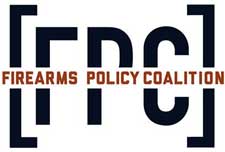
U.S.A. -(AmmoLand.com)- WASHINGTON, D.C. (March 24, 2021) — Today, Firearms Policy Coalition (FPC) announced the filing of an important brief with the U.S. Supreme Court in the case of Holloway v. Attorney General Garland, et al. encouraging the Supreme Court to grant certiorari (review) of a wrong-decided Third Circuit opinion holding that a non-violent misdemeanor crime can result in a lifetime ban on firearms under the Gun Control Act. The reply brief in support of cert.—the last step before the Supreme Court considers whether to hear and rule on the case—can be viewed at Holloway2Acase.com.
Two decades ago, Mr. Holloway was convicted of a non-violent misdemeanor but has been law-abiding ever since. As a result of that conviction, however, he is prohibited from possessing firearms for the rest of his life. Federal law, 18 U.S.C. § 922, prohibits all felons and many misdemeanants from possessing firearms, based on arbitrary state-law distinctions that vary between jurisdictions.
The reply brief responds to the Government’s brief, filed with the Court on March 10, in which the Government argued that because “[f]ederal law has long restricted the possession of firearms by certain categories of individuals,” the government can continue to restrict possession by other categories of individuals, even if today’s categories differ from those historically restricted.
FPC’s latest filing in Holloway argues that the theory underpinning the Gun Control Act’s lifetime ban on non-violent felons and misdemeanants contradicts the history and tradition of the right to keep and bear arms, further expands upon the circuit split dividing the federal courts on this issue, and shows that Mr. Holloway’s petition represents an ideal vehicle for the Court to address both this important question and the methodology that lower courts must use in Second Amendment lawsuits.
“Today, the Second Amendment’s protections differ from jurisdiction to jurisdiction throughout the country,” explained FPC Director of Constitutional Studies Joseph Greenlee, lead author of the reply brief and co-counsel to Mr. Holloway at the Supreme Court. “Mr. Holloway would not have forfeited his Second Amendment rights for driving under the influence in the vast majority of states. But because he happened to be convicted in Pennsylvania, he is forever denied his right to keep and bear arms. We’re hopeful that the Supreme Court will use this opportunity to provide much-needed clarity to lower courts and establish consistency throughout the nation.”
Firearms Policy Coalition and its FPC Law team are the nation’s next-generation advocates for the right to keep and bear arms and adjacent liberties, actively litigating dozens of major lawsuits including federal Second Amendment challenges to California’s ban on “assault weapons” (Miller v. Becerra), Maryland’s ban on “assault weapons” (Bianchi v. Frosh), California’s handgun “roster” and self-manufacturing bans (Renna v. Becerra), Maryland’s firearm carry ban (Call v. Jones), New Jersey’s firearm carry ban (Bennett v. Davis), New York City’s firearms carry ban (Greco v. New York City), the federal ban on the sale of handguns and handgun ammunition by federal firearm licensees (FFLs) to adults under 21 years of age (Reese v. BATFE), and others, with dozens of more cases being prepared. To follow these and other legal cases FPC is actively working on, visit the Legal Action section of FPC’s website or follow FPC on Instagram, Twitter, Facebook, YouTube.
About Firearms Policy Coalition
Firearms Policy Coalition (firearmspolicy.org) is a 501(c)4 nonprofit organization. FPC’s mission is to protect and defend constitutional rights—especially the right to keep and bear arms—advance individual liberty, and restore freedom through litigation and legal action, legislative and regulatory action, education, outreach, grassroots activism, other programs. FPC Law is the nation’s largest public interest legal team focused on the Second Amendment and adjacent fundamental rights including freedom of speech and due process, conducting litigation, research, scholarly publications, and amicus briefing, among other efforts.

The post FPC to SCOTUS: Lifetime Ban on Non-Violent Persons Unconstitutional appeared first on AmmoLand.com.
from https://ift.tt/31eXax5
via IFTTT

No comments:
Post a Comment